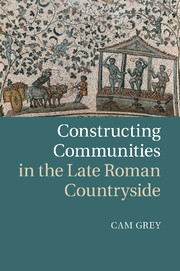Book contents
- Frontmatter
- Contents
- Preface
- List of abbreviations
- Map The late Roman world (sites and regions discussed in the text)
- Introduction
- Chapter 1 Constituting communities
- Chapter 2 What really matters
- Chapter 3 Small politics
- Chapter 4 Power as a competitive exercise
- Chapter 5 Resistance, negotiation, and indifference
- Chapter 6 Creating communities
- Chapter 7 Unintended consequences
- Conclusions
- Bibliography
- Index
Chapter 4 - Power as a competitive exercise
potentates and communities
Published online by Cambridge University Press: 07 September 2011
- Frontmatter
- Contents
- Preface
- List of abbreviations
- Map The late Roman world (sites and regions discussed in the text)
- Introduction
- Chapter 1 Constituting communities
- Chapter 2 What really matters
- Chapter 3 Small politics
- Chapter 4 Power as a competitive exercise
- Chapter 5 Resistance, negotiation, and indifference
- Chapter 6 Creating communities
- Chapter 7 Unintended consequences
- Conclusions
- Bibliography
- Index
Summary
Alongside the collection of negotiations and interactions that made up the internal dynamics of their communities, the peasants of the late Roman world were enmeshed in a collection of complementary relationships with the powerful figures who lived on the margins of their world. These relations of power, authority, and dependence have long been regarded as the principal determinants of the socio-economic contours of the late Roman countryside. Certainly, such accounts as survive of interactions between peasants and the powerful in the period tend to stress the unthinking deference of the former and the unquestioned dominance of the latter. However, these narratives have, on the whole, been constructed by the powerful and for the powerful. When placed within the context of the strategies for the management and mitigation of subsistence and social risk that were outlined in the preceding chapters, interactions between peasants and aristocratic landowners and soldiers, bishops and holy figures take on a subtly different valence.
In this chapter, I sketch the array of powerful figures who interacted with rural communities and their inhabitants in the period. I begin from two propositions which appear at first blush to be contradictory, but which should in fact be regarded as complementary. On the one hand, relations of power are fundamental to an understanding of the structure and functioning of rural communities in the late Roman world. Patrons and would-be patrons operated within a competitive environment, expressing their claims to power and, by extension, authority using a variety of subtly different vocabularies, both familiar and unfamiliar to the peasants who served as their interlocutors. Their capacity to exercise their power effectively rested upon their ability to obtain or elicit an acknowledgment from subordinates that that power was legitimate, and therefore carried authority. This reliance upon the peasantry as a source of legitimacy granted the latter, both singly and collectively, a certain amount of agency in both initiating and structuring their interactions with the powerful.
- Type
- Chapter
- Information
- Constructing Communities in the Late Roman Countryside , pp. 121 - 147Publisher: Cambridge University PressPrint publication year: 2011

